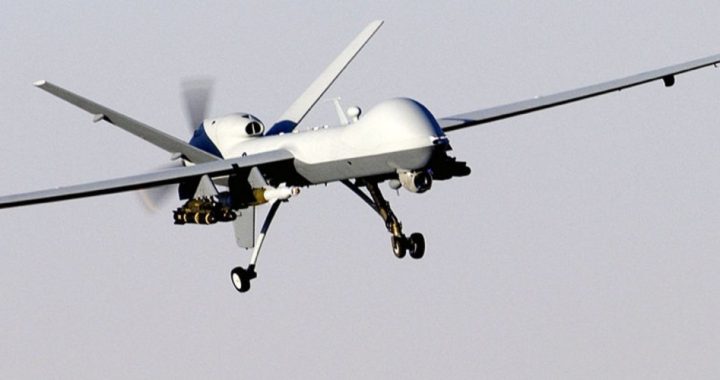
In a remark to the pop group the Jonas Brothers, President Barack Obama told the young men to stay away from his daughters, lest he unleash “Predator drones. You will never see it coming. You think I’m joking?”
That seemingly insignificant and arguably comedic comment reveals the indifference of the White House to the invisible aspect of these deadly weapons and the cavalier attitude of the current occupant to the disturbing fact of their fatal power.
In his new book, The Thistle and the Drone, renowned author, diplomat, and scholar Akbar Ahmed reveals a largely unreported and misunderstood, although critical aspect of the “War on Terror”: the creation of enemies and the further marginalization of Middle Eastern tribal societies.
Of all the insights in Ahmed’s masterful study of this worrisome world issue, perhaps the most troubling is the highlighting of the callousness of the United States to the devastating effects of the drone war being waged in Afghanistan, Yemen, Pakistan, North Africa, etc. The following narrative is illustrative:
A U.S. drone operator in New Mexico revealed the extent to which individuals across the world can be observed in their most private moments. ‘We watch people for months,’ he said. ‘We see them playing with their dogs or doing their laundry. We know their patterns like we know our neighbors’ patterns. We even go to their funerals.
The sound of drones buzzing above the bodies of those being laid to rest in tribal funerals is commonplace. So are the so-called “signature strikes” that send missiles into the procession in case their are any “terrorists” attending the service.
Often, the story is reported, surviving relatives of those killed by the drone assaults are denied the opportunity to bury their dead and perform the ancient rites associated with placing a body in its final resting place. One man severely injured in a drone attack reported that “people are reluctant to go to the funerals of people who have been killed in drone strikes because they are afraid of being targeted.”
On page 92 of a report entitled “Living Under Drones: Death, Injury and Trauma to Civilians From US Drone Practices in Pakistan,” coauthored by the law schools of Stanford and New York Universities, the story is told of several Pakistanis who were intentionally targeted by Hellfire missiles fired at funerals. The grief experienced and related by these men is evident, heart-wrenching, and demoralizing.
One man who lost several relatives in a drone strike tells how the dead from that strike were buried: “They held a funeral for everybody, in the same location, one by one. Their bodies were scattered into tiny pieces. They … couldn’t be identified,” said Massod Afwan.
Is this the sort of behavior that qualifies the area and the attendants to be lit up by a “signature strike” — a strike based not on suspicion of guilt, but of a “pattern of behavior?”
To put it another way, if your uncle, a notorious and despicable mobster, was laid to rest and you attend his funeral would it be lawful for the FBI to shoot you (and any other members of your family at the gravesite) on the spot for displaying behavior indicative of affiliation with the Mafia or associated forces?
Signature strikes are tactics of collectivists. The U.S. government lumps together everyone who looks alike and worships the same god or wear the same traditional clothing. This is the very definition of collectivism and is an embryonic stage of communism.
We rightfully condemn Hitler’s anti-Semitism as demonstrated by Nazi agitprop portraying Jews as rats. Why, then, are those very people who damn Hitler so insensitive to the use by successive American administrations of terms for Muslims such as “bugs” and “cobras”? Is anti-Islamic language acceptable and even the new sine qua non of patriotism? As Dr. Ahmed writes, in post-September 11 America, to reject this abandonment of human decency is “considered not only weak but also anti-American.”
The collectivism that informs the U.S. Middle East foreign policy is reprehensible not only for its inhumanity and patent racism, but it has the effect of creating enemies of those tribal societies that otherwise would be neutral in the war against al-Qaeda and the Taliban.
These signature strikes not only kill scores of innocent people, but they ignite blowback among the survivors, leading to calls for more drone strikes — and the vicious cycle spins on.
Inside this wheel of violence is a triangle-shaped spoke of interests: the United States, the central governments of the countries of the Middle East, and the tribal communities that live under their rule.
These tribes seek autonomy and delivery from oppressive central governments, while the United States seeks to prop up those same autocratic regimes. Ironically, this relationship simultaneously benefits the U.S. government and al-Qaeda, the latter having now “found these tribes to be receptive hosts.” Not, however, for reasons of religious simpatico, but rather because the common goal of fighting domestic central governments and the deadly intervention of the United States makes these two groups ad hoc allies.
Additionally, the constantly changing goal of the “War on Terror” makes it very difficult to attract allies to the American cause among tribal groups. How can local leaders side with the United States when they have no idea which mission they’re enlisting to achieve?
It’s hard for Americans to know the true endgame, too. So many pretexts have been offered: spread democracy, protect human rights, liberate women, destroy al-Qaeda, destroy the Taliban, find and kill Osama bin Laden, etc.
This rotating roster of rationales is one of the worst and most telling aspects of the War on Terror. Dr. Ahmed wrote, “The war [on terror] also provided the groundwork for the arguments to torture prisoners, suspend human rights, and support autocratic and blood-thirsty rulers abroad, while turning a blind eye to the desperate suffering of people on their peripheries.”
There is, as well, a sort of transitive property of the geometry of the “War on Terror.” The U.S. fatal foreign policy kills innocents and drives otherwise neutral tribesmen into the ranks of al-Qaeda. Therefore, by its design, the drone war is, among many things, a recruitment tool for al-Qaeda. There is no way that President Obama and his think tank of national security, military, and intelligence advisors don’t understand this.
Another glaring lack of understanding shared by so many so-called experts within Washington is the failure to appreciate the primacy of tribal identity among those deemed “enemies” in the War on Terror.
The people being assassinated by drone-fired missiles do not associate naturally with any non-sanguineous group — al-Qaeda or even Islam. Their first and most compelling connection is to their tribe and to their lineage group. The strength of this affiliation is demonstrated by a statement made in the 1970s by a Pakistani leader and quoted by Ahmed. “I have been a Pashtun for six thousand years, a Muslim for thirteen hundred years, and a Pakistani for twenty-five,” the tribal leader explained.
We could imagine a contemporary tribal leader making a similar declaration today, only adding the unfortunate coda, “and an enemy of the United States since the first missile killed members of my family.”
September 11 is the day that everything changed for everybody. After that date, “American presidents and administrators increasingly favored security over human rights,” Ahmed says.
Arguably that is so in word, but not in deed. The post-9/11 decrease in liberty has not produced a proportional increase in safety, nor could ever have been thought to do so. Successive presidential administrations and their foreign policy planners must have understood that indiscriminately blowing up villagers while they attend funerals or eat at roadside parks would do nothing to make Americans safer.
Furthermore, despite the assurances from the architects of the Panopticon, the collection of all communication under the never-ending eye of government has not prevented so-called terrorist attacks on our own shores or abroad.
With this in mind, it would appear that when viewed through the discriminating lens of of logic, U.S. foreign policy since September 11, 2001 has been purposefully crafted to create threats where there were none and then use the ostensible danger posed by those threats as the justification for the abandonment of the Bill of Rights and the corresponding expansion of the surveillance state.
The Party of Power (be they Republicans or Democrats) needs al-Qaeda or some other bogeyman to exist in order to justify the growth of the military-industrial-intelligence complex. The corresponding need for increased security permits the legal plunder of the American people.
“As security gained precedence [over liberty],” Ahmed explains, “the use of the drone was almost a logical next step for nations equipped with the tools of globalization.”
In fact, globalization becomes less a foreign policy trajectory and more of a marketing tactic of the immense (and every expanding) military-industrial-intelligence complex and the corps of congressmen that act as salesman staking out new territories for the deadly inventory manufactured by the defense contractors. This expansion of the market makes money, much of which finds its way into the campaign coffers of dozens of influential lawmakers on Capitol Hill.
Finally, Dr. Ahmed offers hope from an unexpected source for how to end the War on Terror.
In the section entitled “America’s Founding Fathers and Tribes,” Ahmed describes the successful efforts of the Republic’s early leadership to co-exist peacefully with a racially distinct, tribal culture.
George Washington and Thomas Jefferson are offered by Ahmed as noteworthy examples of American presidents who eschewed militarism and combat as a way to deal with Native Americans. Both men argued against “an augmentation of military force.” Jefferson, after the Louisiana Purchase, exposed thousands of Native Americans to interaction with American settlers, pushed for a “moderate enlargement of the capital employed in that commerce, as a more effectual, economical, and humane instrument for preserving peace and good neighborhood with [the Indians].”
Ahmed adds, “If the United States declined to use the military and had this ‘humane’ policy toward the tribes, Jefferson declared, the safety of Americans among the Indians ‘will become their interest and their voluntary care.’”
It seems, then, that in this as in so many other ways, America is being guided away from the wisdom of our Founding Fathers.
And what do we get in return for this inhumane treachery?
Every Hellfire missile fired from every drone creates new enemies who will hate America, not for our freedom but for our deliberate denial to these tribal societies of the basic care for others that is the basis of our Constitution and indeed of Christianity.
In the end, the defense and surveillance industry grows, the national treasure shrinks, and the American people are left without money, without morality, and without the liberty that once made them envied citizens of the Shining City on a Hill.
The Thistle and the Drone: How American’s War on Terror Became a Global War on Tribal Islam by Akbar Ahmed is available now.
Joe A. Wolverton, II, J.D. is a correspondent for The New American and travels frequently nationwide speaking on topics of nullification, the NDAA, and the surveillance state. He can be reached at [email protected]



